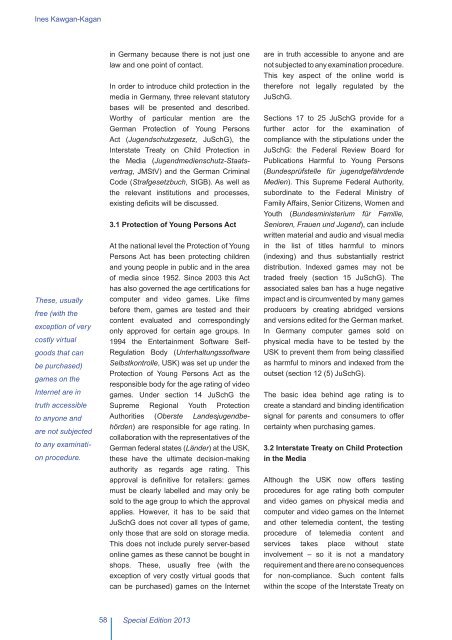ora-schriften-s-2013
ora-schriften-s-2013
ora-schriften-s-2013
Create successful ePaper yourself
Turn your PDF publications into a flip-book with our unique Google optimized e-Paper software.
Ines Kawgan-Kagan<br />
These, usually<br />
free (with the<br />
exception of very<br />
costly virtual<br />
goods that can<br />
be purchased)<br />
games on the<br />
Internet are in<br />
truth accessible<br />
to anyone and<br />
are not subjected<br />
to any examination<br />
procedure.<br />
in Germany because there is not just one<br />
law and one point of contact.<br />
In order to introduce child protection in the<br />
media in Germany, three relevant statutory<br />
bases will be presented and described.<br />
Worthy of particular mention are the<br />
German Protection of Young Persons<br />
Act (Jugendschutzgesetz, JuSchG), the<br />
Interstate Treaty on Child Protection in<br />
the Media (Jugendmedienschutz-Staatsvertrag,<br />
JMStV) and the German Criminal<br />
Code (Strafgesetzbuch, StGB). As well as<br />
the relevant institutions and processes,<br />
existing deficits will be discussed.<br />
3.1 Protection of Young Persons Act<br />
At the national level the Protection of Young<br />
Persons Act has been protecting children<br />
and young people in public and in the area<br />
of media since 1952. Since 2003 this Act<br />
has also governed the age certifications for<br />
computer and video games. Like films<br />
before them, games are tested and their<br />
content evaluated and correspondingly<br />
only approved for certain age groups. In<br />
1994 the Entertainment Software Self-<br />
Regulation Body (Unterhaltungssoftware<br />
Selbstkontrolle, USK) was set up under the<br />
Protection of Young Persons Act as the<br />
responsible body for the age rating of video<br />
games. Under section 14 JuSchG the<br />
Supreme Regional Youth Protection<br />
Authorities (Oberste Landesjugendbehörden)<br />
are responsible for age rating. In<br />
collab<strong>ora</strong>tion with the representatives of the<br />
German federal states (Länder) at the USK,<br />
these have the ultimate decision-making<br />
authority as regards age rating. This<br />
approval is definitive for retailers: games<br />
must be clearly labelled and may only be<br />
sold to the age group to which the approval<br />
applies. However, it has to be said that<br />
JuSchG does not cover all types of game,<br />
only those that are sold on st<strong>ora</strong>ge media.<br />
This does not include purely server-based<br />
online games as these cannot be bought in<br />
shops. These, usually free (with the<br />
exception of very costly virtual goods that<br />
can be purchased) games on the Internet<br />
are in truth accessible to anyone and are<br />
not subjected to any examination procedure.<br />
This key aspect of the online world is<br />
therefore not legally regulated by the<br />
JuSchG.<br />
Sections 17 to 25 JuSchG provide for a<br />
further actor for the examination of<br />
compliance with the stipulations under the<br />
JuSchG: the Federal Review Board for<br />
Publications Harmful to Young Persons<br />
(Bundesprüfstelle für jugendgefährdende<br />
Medien). This Supreme Federal Authority,<br />
subordinate to the Federal Ministry of<br />
Family Affairs, Senior Citizens, Women and<br />
Youth (Bundesministerium für Familie,<br />
Senioren, Frauen und Jugend), can include<br />
written material and audio and visual media<br />
in the list of titles harmful to minors<br />
(indexing) and thus substantially restrict<br />
distribution. Indexed games may not be<br />
traded freely (section 15 JuSchG). The<br />
associated sales ban has a huge negative<br />
impact and is circumvented by many games<br />
producers by creating abridged versions<br />
and versions edited for the German market.<br />
In Germany computer games sold on<br />
physical media have to be tested by the<br />
USK to prevent them from being classified<br />
as harmful to minors and indexed from the<br />
outset (section 12 (5) JuSchG).<br />
The basic idea behind age rating is to<br />
create a standard and binding identification<br />
signal for parents and consumers to offer<br />
certainty when purchasing games.<br />
3.2 Interstate Treaty on Child Protection<br />
in the Media<br />
Although the USK now offers testing<br />
procedures for age rating both computer<br />
and video games on physical media and<br />
computer and video games on the Internet<br />
and other telemedia content, the testing<br />
procedure of telemedia content and<br />
services takes place without state<br />
involvement – so it is not a mandatory<br />
requirement and there are no consequences<br />
for non-compliance. Such content falls<br />
within the scope of the Interstate Treaty on<br />
58 Special Edition <strong>2013</strong>





